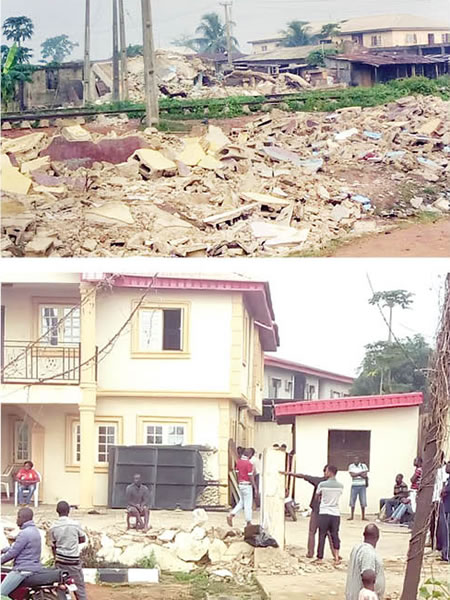The Federal Government through the Nigerian Railway Corporation (NRC) recently launched the commencement of the Lagos-Ibadan railway expansion project. In this report, TOLA ADENUBI examines the confused state many Lagos landlords suddenly find themselves as earth moving tractors continue to mow down buildings. Excerpts:
FOR almost 120 years, the railway system in Nigeria has been running on an obsolete single lane. It was in 1898 that the first railroad in Nigeria was constructed by the British colonial government starting from Lagos and later extending to Kano and Maiduguri and down to Port Harcourt. Initially, the idea was to evacuate the mineral resources from the hinterland down to Lagos rather than linking up the major towns and cities across the nation.
With the passing of the Nigerian Railway Corporation Act of 1955, the company gained its current name as well as the exclusive legal right to construct and operate rail service in Nigeria. Many people would later blame the country contentious NRC Act of 1955 as being responsible for the quagmire that the industry would later be stuck in which has militated against its expansion and development. Several other countries whose railway transport system started around the same year with Nigeria have since moved ahead to build several rail lines criss-crossing their countries and introduce fast trains that would cover hundreds of kilometres in a few hours.
By 1964, rail network in the country reached its maximum extent. Shortly after that, the NRC which was once the largest employer of labour in the country entered a long period of decline, inept management, and eventually a complete lack of maintenance of its assets. By 1988, the corporation declared bankruptcy, and all rail traffic stopped for six months. Sometimes later, traffic resumed and stopped altogether in 2002.
In 2006, the administration of ex-President Olusegun Obasanjo made efforts to restore the rail lines and add new locomotives with foreign assistance, especially from China. The effort did not yield much fruits until the administration of the President Goodluck Jonathan. In December 2012, regular scheduled passenger service was restored on the Lagos to Kano line.
This time round the government of President Muhammadu Buhari is trying to introduce a second line to the system and put in place the standard gauge in order to bring the country at par with other countries of the world.
Properties to be demolished
Efforts in this regard started in earnest last week when the NRC began to demolish structures build in the right of way of the railway line. The NRC, during a press briefing to mark the commencement of the operation said all properties within 50 feet of the rail tracks will be demolished.
According to the NRC Managing Director, Mr Fidet Okhoria, any property within this range will go down because the corporation did not grant the owners such lands for use.
“We are going to demolish all properties within 50 feet of the rail lines because those properties are sitting on illegal space and land. Except properties that were given out to owners by the corporation on lease, and such property owners must show us documents backing up their lease agreement with the NRC.
“Aside this, every property within 50 feet radius will have to give way to the Lagos-Ibadan railway expansion project,” Okhoria stated during the press briefing.
The first leg of the expansion project, the Lagos-Ibadan route which was flagged off recently is expected to cut through Lagos, bringing down buildings and other multi-billion naira property investments.
From Ebute-Metta Junction down through Yaba, Mushin, Oshodi, Ikeja, Agege, Iju, Agbado, Itoki and onwards to Ijoko in Ogun State, property owners in these towns are already confronted with the reality of losing their investments; some are lifetime investments.
Speaking to Sunday Tribune exclusively, the spokesperson of the Lagos District of the NRC, Mrs. Khadijat Aroyewun-Adekomaiya explained that the space between the properties and that would be demolished and the rail lineis not entirely defined as this could change from location to location.
“The space set for demolition as of now is 15 metres to the right, and 15 metres to the left of the rail track, thereby making a total of 30 metres. This will be the spaces to be set for properties along the rail track corridors. Any property within that range goes down.
“However, for locations where we have railway stations, the space that will be set aside for demolition will be much more than that. This also applies to locations where we have level crossings. The spaces set aside before demolition will be much more than the 15 metres right and 15 metres left.
“This is so because a railway station and level crossing will be needing much more space and properties within its range will have to go down,” she told Sunday Tribune.
Many Lagos landlords who own properties along the railway tracks are currently rueing their impending loss as many of them are yet to come to terms with the exact space that will be needed for demolition.
In the words of Chief Oluyinka Awoniyi, a landlord in Iju area, “conflicting information from different sources at the NRC is sending jitters through the spine of most of us landlords.
“We hear of 50 feet. We also hear of 15 metres to the left, and 15 metres to the right. However, there are locations that are yet to be defined. For a few of us that have properties very close to the railway stations, we hear our own case is different, as the space to be considered will be much wider, meaning we are bound to lose our homes.
“Does that mean those of us that have houses close to the level crossings and railway stations will pay more in sacrifice? Is it that the proximity to the locations which I had celebrated as a blessing all my life will suddenly become my woe?
“Even the 15 metres to the left and right, how are they measuring it? We hear that sometimes, it is shorter in some cases depending on location, while in some cases, it is longer,” Chief Awoniyi lamented.
For the landlords in other areas, issues relating to monetary compensation ought to have been sorted long before the demolition started.
According to Mr. Funsho Odara, a landlord in Mushin area, “we heard that the demolition has already started. Some properties have already been mowed down for the Lagos-Ibadan railway expansion.
“I am not against the rail expansion. But property owners ought to be compensated. How can the NRC now tell us that we won’t get a penny for our properties? If modernisation must happen, must the citizens cry?
“The authorities in the NRC have refused to listen to our pleas that our properties should be valued and owners given the necessary money to start a new life. In this harsh economic condition, is it right that property owners along the Lagos-Ibadan railine expansion be thrown out of their homes without a penny?
“Please, help us tell the government that we will be needing compensation if our properties have to give way for the rail line. Without compensation, it is as good as asking many aged landlords like me to go to our early graves over the rail line expansion.”
Panic at Ijoko
For residents of Ijoko town in Ogun State, every passing day is like a date with their nemesis. The demolition has already swept through Agege, Iju, and Ope-Ilu. For residents of Oposuru, a community after Ope-Ilu, the NRC demolition team was expected to get there by Friday.
Speaking to Sunday Tribune exclusively, an hotelier who identified herself simply as Mrs Ayorinde, whose property stands some metres away from the Oposuru rail line, was seen wailing and crying when we visited.
“Won’t I die of hypertension? Because I don’t know if the demolition will get to my property.
“I have heard of 50 feet. I have also heard of 15 metres to the right and to the left. But you know my hotel is close to the Oposuru train station, and for stations, we also hear the distance to be measured for demolition will not be defined; so I have been sleeping in my church since last week.
“This hotel is my only means of livelihood. It is from the proceeds I feed, and pay my bills which include school fees of my children. If it is demolished, then my world has ended. Please, help me talk to the NRC to spare my hotel. It’s not even a standard one. It’s just a small building which I converted to a hotel when I lost my job.
“I have called people to help me measure the distance. They said my hotel is some inches after the 15 metres to be measured. But it is located near a station, and measurement for station location, we were told is unlimited. They said station location and level crossing will be expanded more. What should I do? I am dying,” Mrs Ayorinde wailed while narrating her ordeal.
In Ibadan, the end of the first leg of the expansion project, the situation of property owners along the rail track starting from Omi-Adio, Apata to Dugbe areas of the city is not better.
Many of those who would be affected have erected make-shift shops along the path of the railway. They told Sunday Tribune that they knew they were not permanent occupiers of the space. In fact, they had been asked to leave several times. Some of them did but soon returned.
Those who have houses close to the rail lines are more concerned, after hearing what is already happening in Lagos. The landlords around NNPC area did not want to speak with Sunday Tribune. However, one of them who spoke on condition of anonymity said the landlords are already meeting and keeping their fingers crossed on the new development.







